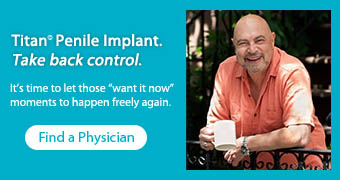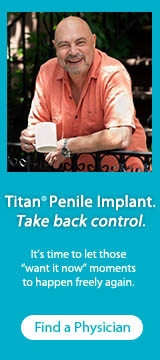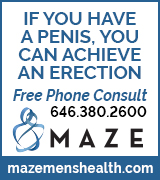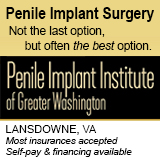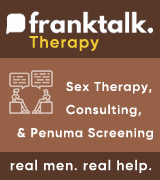I joined FrankTalk.org in December and I have spent a great deal of time during the last few weeks reviewing many of the entries in most of the forums and would like to begin by thanking so many of you for contributing with such detail on what is a highly personal and private subject. The physical and mental anguish that ED has brought into my life has been enormous and as we all know, the medical professionals tell you only so much. And, while I’m not the first to say this…knowing that others, many others our experiencing similar challenges and frustrations, this does help us cope with our own circumstances. My story begins…
Diagnosis:
In March of 2011, at the age of 54, I was scheduled for a physical exam as a prerequisite to a colonoscopy that was to occur at the end of August. I was relatively healthy in that I have played racquetball several times a week for almost a decade and – while all of us can afford to loose some weight – I am no more than 10 or 15 pounds from my ideal weight. I believe that it had been 4 or 5 years since my last physical exam. Within a week or two after my exam, I received a call from my physician recommending that I make an appointment with a urologist as my PSA score was on the high side – 12.5. Within a few weeks I was in the urologist’s office and he recommended that I have another PSA test to confirm the accuracy of the previous test. One week later the urologist confirmed the 12.5 PSA and proceeded to put me on an antibiotic for a month to see if the elevated score was due to an inflammation in the prostate. Following a month of antibiotics and yet another PSA test my score remained at 12.5. With this news the urologist recommended that I have a biopsy on my prostate. For those of you who have never had this procedure – it is not pleasant. It’s not excruciatingly painful but it is excruciatingly uncomfortable. I did some research on the internet prior to the procedure and it was documented that the patient will receive either a general or local anesthesia prior to the biopsy. When the nurse came into the room where the procedure was to take place, I asked her what the doctor used for this – general or local. She informed me, neither! Anyway, in short, the easiest way to describe this procedure is having a large turkey baster with an alligator clip on the tip shoved up your ass. The urologist took 5 samples each from the left side and the right side of the prostate – 10 samples in all. The procedure lasts about six or seven minutes but by the time you are nearing the end of the process your sphincter is about ready to explode. For about a week following this procedure you literally have a “pain in your ass” and some blood clotting in your urine. A week later in the urologist’s office it was confirmed that I had prostate cancer. My Gleason scores were 3+3 on the right side and 3+4 on the left side. Without much hesitation, my urologist recommended that I undergo a Radical Prostatectomy due to my age and family history. My mother passed away in her late 80’s and my father is still kicking at 92 and had a RP at age 72. What I think is so surprising about this disease is that for most of us we have no idea that something is amiss. I felt no pain, I did not have a slow stream when urinating, I did not have to urinate frequently, etc. I felt completely normal.
Surgery:
The urologist did briefly give me a run down of all of the options from active surveillance, surgery, hormone therapy, chemotherapy and radiation therapy but I’ll be honest that the news caught me by such surprise that I really didn’t absorb what he was saying. Since his recommendation was surgery, the bulk of the discussion was centered on the two different surgical techniques – open surgery versus DiVinci Robotic Laparoscopic surgery. Since my urologist performs only the open surgical method, he emphasized that procedure stating that the primary difference is in the healing process and not in the success of the surgery or the after effects of the surgery. I have a close family friend who is a urologist and after discussing this with him (and he performs exclusively the Robotic method), he concurred with my urologist and said that the experience of your urologist combined with feeling comfortable with him is what is most important, not the technique used. It was described to me that a nerve-sparing process is used in both surgical techniques and when the cancer is caught early the possibility of saving the nerves near the tissue being removed is increased. So, in October of 2011, I had my surgery at 8:00 am.
Post-surgery:
The surgery was uneventful in that I remember being wheeled into an operating room where everything what made of stainless steel and the temperature was very, very cold. Not too unlike being parked in refrigeration truck. The anesthesiologist said I would be asleep within 10 seconds and I only recall counting to three before I woke up in post-op. I remember being wheeled up to my room and being very drowsy. It was early afternoon. I remained hospitalized for 3½ days and was not in any serious pain or discomfort. This was the first time I was ever on a Foley Catheter and while in the hospital I was not in any discomfort. The most difficult thing I remember was the first bowel movement (about day 3) and the pressure on the catheter and the difficulty in wiping myself. The incision that ran from the top of my penis to my bellybutton was still covered in gauze and secured with surgical staples. The twisting of my torso to wipe myself was really quite painful.
After being discharged I still remained pain free for another 24 hours until I had my first bladder spasm as a result of being on the catheter. A bladder spasm (at least what I’m calling a bladder spasm) is an intense pain that was occurring in the penis and the feeling was like someone was yanking on my manhood trying to separate it from the rest of my body. I would double over in pain and then urine would begin to leak from the area where the catheter enters the penis. For two consecutive days I was experiencing this type of spasm 20 – 25 times each day. I called the urologist and he prescribed some medication which “might” help alleviate the problem but the potential side effects were so significant that I decided against it. Having endured this for a two day period I attempted to determine what was triggering this. What I believe was the culprit was movement, especially sudden movement. I was feeling quite comfortable when I left the hospital so that when I got home I would rest in bed or on the couch but think nothing of getting up at a normal pace and walking the stairs or going into the kitchen. My conclusion was that this sudden movement was causing the tube inside my bladder to move somehow and was triggering these spasms. By day 3, I would get up very slowly and walk slowly to wherever in the house I was going and the frequency of the spasms diminished considerably. In all, I was on a catheter for 12 days.
Post-post surgery and the land of ED:
It has now been more than a year since my surgery and the good news is that my PSA remains at zero so it is a safe bet (at least in the foreseeable future) that I am cancer free and that I will not die from Prostate Cancer. What I say after this point may sound trite and ungrateful but, I think for those of you who have had a Radical Prostatectomy will relate… because my Prostate Cancer was caught early and I elected to have a Radical Prostatectomy performed by an experienced surgeon, I am not surprised that I am cancer free. What I am surprised at is the after effects of the surgery and the impact that this has had on my life both physically and emotionally.
We know that the two most significant after effects of prostate surgery are incontinence and ED. I count my lucky stars that I have experienced very little incontinence. After a few months of “intermittent leaking”, I am now pretty secure except when I have a hard sneeze or cough. My wardrobe has changed to wearing black or very dark trousers so, that in the event I haven’t tapped my bladder recently and I experience a sudden sneeze or cough, I don’t end up with an embarrassing “spot” on my pants. I also have experienced some leaking when my wife and I are “attempting” intimate relations. As the incredibly small percentage of blood that I am able to muster works its way into my “throbbingless member”, unless my bladder has been completely tapped of every last drop, I will sometimes leak a drop or two onto the bed sheets – call it post-RP foreplay. Always a turn on for any couple!
I have read many of the testimonials on this website and in several books dedicated to the subject of Prostate Cancer and I am always amused (I’m being facetious here) by the term “nerve sparing” surgery because in almost all cases nerve sparing techniques were used by the surgeon and in almost all cases the guy is suffering with severe ED. Sometimes I wonder why urologists even bother to use that expression… it is misleading and only offers false hope. Post RP, most of us have been prescribed the pills Viagara, Cialis and Lavitra (I’ve tried all three with little success) and may have had marginal success for a short time but after several months “little spike” ceases to respond to the “little blue pill”. The pump came next. The pump (VED) is my first bedroom appliance and I have little to say that is positive about the results. It’s too bad Kitchen Aid hasn’t designed an attachment to its Artisan mixer with similar functionality! I have tried to use it in conjunction with the pills but by the time the constriction ring “snaps” into place, my engorged member looses all its feeling – numb is probably the best description. I’ve tried using different sizes of rings and either it is too large or it squeezes the life out of my penis. When my wife and I try to have intercourse at this point, there is no pleasure for her either as she reacts as though she is being impaled with a railroad spike.
Depression and guilt:
What has really surprised me is how much ED has impacted my life and how depressed this situation has left my wife and me. Prior to my operation, I was fortunate that I had absolutely no problems in this area. I wasn’t an “Italian Stallion” or a “Surging Sturgeon” but everything worked and for a reasonable amount of time – enough to satisfy both of our needs. Now…I try to put things in perspective but I am often in finding myself in a dejected stupor. I see on the nightly news, video of wounded war veterans missing limbs and with the most awful injuries and I feel guilty that I’m glum because I “can’t get it up”! You look around you and you see so much pain and suffering, job loss, long term chronic illnesses and I’ve become neurotic about the fact that I have ED. I have a good job, a lovely home, a healthy wife and healthy children – why am I so miserable? I’m embarrassed that I feel so guilt-ridden about something like this.
Next phase: The final frontier:
In my last appointment with my urologist in November, I informed him of my feelings and frustrations with the after effects of the surgery. I asked him about injections – even though the thought performing this procedure on myself borders on self-mutilation! What us guys will do just to get a stiffy!! My urologist dismissed the injections as it is prone to cause scar tissue to form along the walls of the penis and in conjunction with my age, he did not see it as a good long-term solution. He did however strongly recommend an implant. Since this conversation I have scoured the internet to learn as much as I can on the surgery and the true success rate and overall satisfaction by the recipients. FrankTalk.org has been an especially helpful source.
On Feburuary 11th I have a follow-up appointment with my urologist to discuss the implant. I have been preparing my list of questions for this appointment based on much of what I’ve read. Here’s what I’ve got so far:
• How many implants have you performed? Lifetime? Yearly?
• What type of anesthesia is used?
• Describe pre-operation steps? Food? Drink? Laxatives?
• Describe post-operation steps? Catheter? Pain? Medications? Activity? Return to work? Any effect on bladder control? Removal of stitches?
• What AMS-700 model – CX or LGX? (My urologist told me that he uses AMS-700 series implants)
• Do you inflate the tubes slightly at the end of surgery?
• Where are the incisions performed in the abdominal area? In the scrotal area? (Horizontal incision in the scrotum)
• How will the implant impact the length and girth of my penis?
• Will the tips be inserted into the glans (head of the penis)?
• What do recipients’ of the implant say about feeling, stimulation or sensitivity of the penis when it’s inflated?
• Describe the post operation process with regards to the implant. Pumping, to what percentage, for how long, etc.
I realize that this posting is quite verbose and anyone who has made it this far, I appreciate it. I felt that it was better to provide too much information then not enough.
What other questions or additional information should I want to know about in regards to the implant and implant surgery for this consultation in February?
Thank you again to all who contribute to this invaluable website!
My Story
Re: My Story
I think you have a pretty good list of questions. Here is another list of questions... just in case you might have forgotten a few. 
viewtopic.php?f=6&t=1260&p=8187#p8187
Good luck in your quest.
viewtopic.php?f=6&t=1260&p=8187#p8187
Good luck in your quest.
22cm Coloplast Titan OTR implanted Feb 2012 by Dr Francois Eid in NYC.
Initial implant experience here: viewtopic.php?f=6&t=1308
Initial implant experience here: viewtopic.php?f=6&t=1308
Re: My Story
Welcome to the group and I think it very likely your implant will be a very good solution to your ED, as it has for many others here.
One piece of info I can offer you is regarding the catheter. I had open surgery for BPH nine years ago in which the doc removed 80% of my huge prostate, which was similar to your RP. I had a catheter for 10 days post-op and I had the same problem you did with sudden painful attacks from the catheter. The nurses at the hospital tried to tell me the attacks were bladder spasms but I don't believe that. I think they were caused by urine leaking down the urethra, and the urethra was sensitive to pain due to the surgery. I was working from home during my recovery and the attacks happened mostly when I changed from a sitting to a standing position, which gives me evidence it was the leaking urine that caused the problem, not a bladder spasm. A friend who is a nurse told me that the catheters sometimes do not mate with the body well and give this problem. One nurse and my doctor tried to pump up the catheter to solve the problem, but it did not solve the problem. After my implant surgery I had a catheter for about 19 hours. This time though I had no problems with pain associated with the catheter. I suspect this one just was seated better in my bladder. And I also suspect that because of the differences in the surgery that if there had been a leak from the catheter that it would not have burned in the urethra, but I am guessing on that one. So hopefully you will also not have any problems with the catheter this time either.
Your list of questions looks very complete. One you might add would be to ask how your doctor will be available if you should have any problems post-op. I’m sure he will say he will be readily available via phone at all hours, but I bring it up as some of the guys here have been hesitant to contact their doctor. From what I have seen here, the healing process varies a lot so if you are having a problem your doctor is the ultimate guy to ask about what is going on and you want to be sure you can easily contact him.
Best wishes on your future surgery.
One piece of info I can offer you is regarding the catheter. I had open surgery for BPH nine years ago in which the doc removed 80% of my huge prostate, which was similar to your RP. I had a catheter for 10 days post-op and I had the same problem you did with sudden painful attacks from the catheter. The nurses at the hospital tried to tell me the attacks were bladder spasms but I don't believe that. I think they were caused by urine leaking down the urethra, and the urethra was sensitive to pain due to the surgery. I was working from home during my recovery and the attacks happened mostly when I changed from a sitting to a standing position, which gives me evidence it was the leaking urine that caused the problem, not a bladder spasm. A friend who is a nurse told me that the catheters sometimes do not mate with the body well and give this problem. One nurse and my doctor tried to pump up the catheter to solve the problem, but it did not solve the problem. After my implant surgery I had a catheter for about 19 hours. This time though I had no problems with pain associated with the catheter. I suspect this one just was seated better in my bladder. And I also suspect that because of the differences in the surgery that if there had been a leak from the catheter that it would not have burned in the urethra, but I am guessing on that one. So hopefully you will also not have any problems with the catheter this time either.
Your list of questions looks very complete. One you might add would be to ask how your doctor will be available if you should have any problems post-op. I’m sure he will say he will be readily available via phone at all hours, but I bring it up as some of the guys here have been hesitant to contact their doctor. From what I have seen here, the healing process varies a lot so if you are having a problem your doctor is the ultimate guy to ask about what is going on and you want to be sure you can easily contact him.
Best wishes on your future surgery.
Implant surgery by Dr. John Greisman 10/31/2012 - Installed AMS CX700
-
MARKOS2018
- Posts: 472
- Joined: Mon Aug 22, 2011 5:20 pm
Re: My Story
I wonder if you read Michael Korda's, a bestseller writer, about his journey with prostate cancer. It was very compelling and really informative, just as you have posted. The one thing that I learned from Korda's book was to select a surgeon close to where you live. This will help tremendously if you have a problem.
I have the implant now but there is always a chance of getting prostate cancer. It helps to hear what one can expect as far as the surgery goes and the aftermath.
Mike
I have the implant now but there is always a chance of getting prostate cancer. It helps to hear what one can expect as far as the surgery goes and the aftermath.
Mike
Titan implanted by Dr Eid Due to Peyronies, Implant was the only option for me.
Re: My Story
Wow Woodworker57....Your urologist is doing you a miss service by not letting your go on trimix....it is a wonderful way of bringing back your sex and why he would not offer that to you is beyond me....maybe it is the $$$ for the implant that is driving him that direction  And I don't buy his explanation for not using trimix.... a lot of urologists don't even understand what trimix can do for a guy, not just a nice erection, but mentally it brings back our manlyhood....and then further encourages healing.
And I don't buy his explanation for not using trimix.... a lot of urologists don't even understand what trimix can do for a guy, not just a nice erection, but mentally it brings back our manlyhood....and then further encourages healing.
Just 12 months out, not trying trimix and just jumping to an implant is a very big step.
You need to give penile rehab a chance before going with an implant. It takes time for rehab to take place and the sooner the better. You have nothing to loose and everything to gain by trying trimix, it is wonderfull and has impoved my ED over time to where I am almost back to normal after about 1 1/2 years out of RP.
I wish you the best and would reject the attitude of your urologist regarding the use of Trimix, I would find someone else at this point.
Cheers,
Curt
Just 12 months out, not trying trimix and just jumping to an implant is a very big step.
You need to give penile rehab a chance before going with an implant. It takes time for rehab to take place and the sooner the better. You have nothing to loose and everything to gain by trying trimix, it is wonderfull and has impoved my ED over time to where I am almost back to normal after about 1 1/2 years out of RP.
I wish you the best and would reject the attitude of your urologist regarding the use of Trimix, I would find someone else at this point.
Cheers,
Curt
-
rode2nowhere
- Posts: 100
- Joined: Wed Dec 19, 2012 9:13 am
Re: My Story
excellent story, and about the way i feel too after less than 3 months after the robotics surgery. No good insurance to even fight E D. Like someone just took my sex life away.
Re: My Story
rode2nowhere wrote:excellent story, and about the way i feel too after less than 3 months after the robotics surgery. No good insurance to even fight E D. Like someone just took my sex life away.
A lot of insurance companies will not cover the cost of the drugs or trimix to fight ED....mine does not...You should be able to get free samples from your Uro that might help with finding what will work for you and there are all sorts of internet options to make it more affordable. Trimix is actually not bad for cost and is pretty much guaranteed to work and is great for rehab.
There is absolutely no reason in most cases to loose your sex life......you need to just be proactive and don't wait.....
Cheers,
Curt
-
Woodworker57
- Posts: 16
- Joined: Sat Dec 01, 2012 2:11 pm
Re: My Story
First of all thank you all for responding so quickly…
Rim1818 – the link to the list of questions is terrific. I’ll be spending the next couple of days picking and choosing those that I feel are appropriate for me.
Dave92014 – your description of the pain associated with the catheter mimics exactly what I was experiencing. I did attempt to research what the pain was and the term “bladder spasm” was all that I could find. Your theory of a urine leak down the urethra does make some sense though. What is confirmed in your statement was changing from a sitting or reclined position to a standing position triggering the pain. As my narrative said, getting up very slowly when changing positions helped tremendously in minimizing the pain. Fortunately, the time required on a catheter after implant surgery is minimal.
Hardrod – Thank you for the reference to Michael Korda’s book. I will look it up and give it a read. The two books that I have found informative are:
• After Prostate Cancer: A What-Comes-Next Guide to a Safe and Informed Recovery by Arnold Melman M.D., Rosemary Newnham
This is a must read for anyone who is planning to undergo prostate surgery or any major prostate procedure as it very clearly and concisely explains all of the options and the realistic after effects of each procedure.
• Conquer Prostate Cancer: How Medicine, Faith, Love and Sex Can Renew Your Life by Rabbi Edgar J. Weinsberg, Dr. Robert I. Carey
This book is primarily a biographical essay about Rabbi Edgar J. Weinsberg’s experience with prostate cancer and what he has done to get through the physical and emotional strains that the surgery and after effects cause on the patient and the family. He does include a sizable number of testimonials of other RP survivors and it is helpful to hear their stories as well. It was only after I finished both of these books that I discovered FrankTalk.org.
Trimix60 – I have heard many testimonials as yours supporting Trimix and was quite surprised when my urologist dismissed this option as quickly as he did. As I stated above, I not enthusiastic about sticking myself with any needles but I understand that it is not the same thing as an intravenous injection that you may get for certain illnesses. I will definitely bring this option up again during my up-coming appointment.
I have also heard however, that with the constant changes to medical insurance plans that there may be a time in the not too distant future that an implant may not be covered by insurance. Currently my insurance will cover this procedure. At $12 - $20 thousand dollars for this operation (with two children in college) it will be a long time before I would be able to spend this kind of money on this surgery. I realize that – in and of itself – cost should not be the sole reason to have this surgery but it’s worth strong consideration.
Rim1818 – the link to the list of questions is terrific. I’ll be spending the next couple of days picking and choosing those that I feel are appropriate for me.
Dave92014 – your description of the pain associated with the catheter mimics exactly what I was experiencing. I did attempt to research what the pain was and the term “bladder spasm” was all that I could find. Your theory of a urine leak down the urethra does make some sense though. What is confirmed in your statement was changing from a sitting or reclined position to a standing position triggering the pain. As my narrative said, getting up very slowly when changing positions helped tremendously in minimizing the pain. Fortunately, the time required on a catheter after implant surgery is minimal.
Hardrod – Thank you for the reference to Michael Korda’s book. I will look it up and give it a read. The two books that I have found informative are:
• After Prostate Cancer: A What-Comes-Next Guide to a Safe and Informed Recovery by Arnold Melman M.D., Rosemary Newnham
This is a must read for anyone who is planning to undergo prostate surgery or any major prostate procedure as it very clearly and concisely explains all of the options and the realistic after effects of each procedure.
• Conquer Prostate Cancer: How Medicine, Faith, Love and Sex Can Renew Your Life by Rabbi Edgar J. Weinsberg, Dr. Robert I. Carey
This book is primarily a biographical essay about Rabbi Edgar J. Weinsberg’s experience with prostate cancer and what he has done to get through the physical and emotional strains that the surgery and after effects cause on the patient and the family. He does include a sizable number of testimonials of other RP survivors and it is helpful to hear their stories as well. It was only after I finished both of these books that I discovered FrankTalk.org.
Trimix60 – I have heard many testimonials as yours supporting Trimix and was quite surprised when my urologist dismissed this option as quickly as he did. As I stated above, I not enthusiastic about sticking myself with any needles but I understand that it is not the same thing as an intravenous injection that you may get for certain illnesses. I will definitely bring this option up again during my up-coming appointment.
I have also heard however, that with the constant changes to medical insurance plans that there may be a time in the not too distant future that an implant may not be covered by insurance. Currently my insurance will cover this procedure. At $12 - $20 thousand dollars for this operation (with two children in college) it will be a long time before I would be able to spend this kind of money on this surgery. I realize that – in and of itself – cost should not be the sole reason to have this surgery but it’s worth strong consideration.
-
rode2nowhere
- Posts: 100
- Joined: Wed Dec 19, 2012 9:13 am
Re: My Story
Even not considering the cost, the thought of a needle in my penis, but you have to do what you have to do. I am not scheduled to see my urologist till feb. 11th. Long way off and he does not seem to care if I have ED or not..........
Re: My Story
rode2nowhere wrote:Even not considering the cost, the thought of a needle in my penis, but you have to do what you have to do. I am not scheduled to see my urologist till feb. 11th. Long way off and he does not seem to care if I have ED or not..........
I used Trimix for 20 months and over that time stuck myself about 120 times. I am squeamish about doing such things but after the first time I did not have any problem doing it. The pain is very slight so the only real problem is the thought of it. On the other hand it stopped working for me after 18 months. When I discussed that with my urologist he said that he sees that problem all the time and that the trimix is acidic so that eventually creates additional blood flow problems and thus more ED. One guy here said he used trimix successfully for 10 years so my experience may be different that what you would get. My doc also brought up the fact that Medicare cut backs might stop them from covering the implant. Since most insurances do not cover trimix or birth control pills it is only one step more to have them not cover implants. Thus you have a choice which involves unknowable events. I wouldn't suggest that it is obvious that you should try trimix or that it is obvious that you should go for the implant ASAP. There are reasons for and against either choice. The problem of sticking yourself though is IMO the least of the reasons.
Last edited by Dave92014 on Fri Jan 04, 2013 9:06 pm, edited 1 time in total.
Implant surgery by Dr. John Greisman 10/31/2012 - Installed AMS CX700
Who is online
Users browsing this forum: biobob, Discovernew, Nebraska64, stmcknig, Taggart423 and 511 guests
